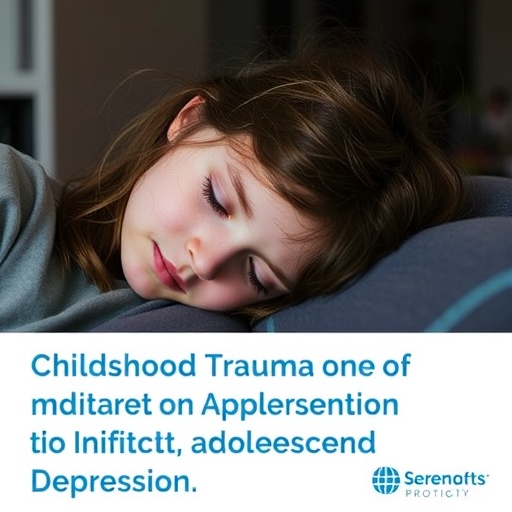In recent years, the complex interplay between childhood trauma and mental health has drawn significant attention from researchers. A new study titled “The Effect of Childhood Trauma on the Alleviation of Transdiagnostic Depressive Symptoms and the Mediating Role of Resilience in Outpatient Adolescents” offers a comprehensive analysis of how early adverse experiences may influence depressive symptoms later in life. This groundbreaking research sheds light on the critical importance of resilience in moderating the impacts of childhood trauma on mental health outcomes among adolescents.
Childhood trauma encompasses a variety of adverse experiences, including emotional, physical, and sexual abuse, neglect, and the witnessing of violence. Such traumatic experiences can lead to dire consequences, manifesting in various psychiatric disorders during adolescence and beyond. The research conducted by Sarnola et al. meticulously investigates how these early traumatic experiences contribute to the persistence and severity of transdiagnostic depressive symptoms, which are not limited to a singular diagnostic category but span across various related mental health issues.
The study posits that resilience—a phenomenon defined as an individual’s capacity to adapt and rebound from stress and adversity—plays a pivotal role in mediating the relationship between childhood trauma and depressive symptoms. In this context, resilience can potentially buffer the negative effects of trauma, allowing affected individuals to experience improved mental health outcomes despite their adversities. By focusing on resilience, the researchers aim to provide a pathway for interventions that could help adolescents navigate their mental health challenges more effectively.
To understand the specific mechanisms through which resilience operates, the researchers utilized a comprehensive methodology involving a diverse participant group from outpatient settings. The use of standardized psychological assessments allowed for an accurate measurement of both the severity of trauma experienced and the degree of resilience exhibited by the participants. This rigorous evaluation highlights the multifaceted nature of adolescent mental health and the need for tailored therapeutic interventions based on individual experiences and strengths.
Furthermore, this study emphasizes the importance of interdisciplinary collaboration in addressing mental health issues stemming from childhood trauma. By integrating findings from psychology, psychiatry, and social work, the authors advocate for a holistic approach to treatment that recognizes the myriad factors contributing to mental health difficulties. This multidisciplinary perspective ensures that interventions are well-rounded and effective in their delivery.
As the prevalence of mental health issues among adolescents rises, the urgency for effective prevention strategies has never been more critical. The findings of this study suggest that promoting resilience could serve as a protective factor, potentially reducing the incidence and severity of depression in individuals who have experienced trauma. By recognizing the role of resilience, clinicians and educators can work together to create environments that foster this crucial trait in young people.
A vital aspect of this research is its focus on practical implications for mental health professionals. The study identifies specific interventions aimed at enhancing resilience among adolescents, which can be implemented within therapeutic practices. These may include skills training, cognitive-behavioral strategies, and support programs that equip young individuals with the tools to manage stress and adversity effectively. Thus, this research not only contributes to academic discourse but also serves as a valuable resource for practitioners in the field.
Moreover, this study’s results underscore the significance of early intervention in addressing the impacts of childhood trauma. By identifying at-risk youth and providing timely support, mental health practitioners can mitigate the long-term consequences of trauma. The proactive approach advocated by the researchers advocates for routine screenings in schools and communities, ensuring that children receive the care they need when it matters most.
In the broader context of mental health discourse, this research contributes to the growing recognition of trauma-informed care. The understanding of how trauma shapes mental health outcomes has led to a paradigm shift in how services are delivered. Professionals are increasingly encouraged to adopt a trauma-informed approach, which emphasizes understanding, recognizing, and responding to the effects of all types of trauma.
The study’s findings have garnered attention from various sectors, highlighting the societal implications of childhood trauma and mental health. By illuminating the connections between early adversity and later life challenges, the research calls for a collective responsibility to provide supportive environments that nurture resilience in children. Policymakers and community leaders are urged to collaborate in developing frameworks and resources that prioritize mental health initiatives, particularly for vulnerable populations.
Ultimately, the insights provided by Sarnola et al. present an imperative message: the impact of childhood trauma does not have to dictate an individual’s mental health trajectory. With the right support systems in place, it is possible to foster resilience and facilitate healing, enabling adolescents to overcome their past experiences. As we move forward, integrating resilience-focused strategies into mental health care will be crucial in supporting the well-being of future generations.
In conclusion, the study on childhood trauma, depressive symptoms, and the role of resilience represents a significant advancement in our understanding of adolescent mental health. It calls for an ongoing dialogue between researchers, clinicians, educators, and the community to ensure that all young people have access to the transformative support they need. By prioritizing resilience and addressing the roots of trauma, we can create a brighter future for adolescents navigating the challenges of mental health.
Subject of Research: The impact of childhood trauma on depressive symptoms in adolescents, with a focus on resilience
Article Title: The Effect of Childhood Trauma on the Alleviation of Transdiagnostic Depressive Symptoms and the Mediating Role of Resilience in Outpatient Adolescents
Article References:
Sarnola, K.M., Kraav, SL., Kekkonen, V. et al. The Effect of Childhood Trauma on the Alleviation of Transdiagnostic Depressive Symptoms and the Mediating Role of Resilience in Outpatient Adolescents.
Journ Child Adol Trauma (2025). https://doi.org/10.1007/s40653-025-00728-8
Image Credits: AI Generated
DOI: 10.1007/s40653-025-00728-8
Keywords: Childhood trauma, resilience, adolescent mental health, depressive symptoms, transdiagnostic symptoms, early intervention, trauma-informed care.




